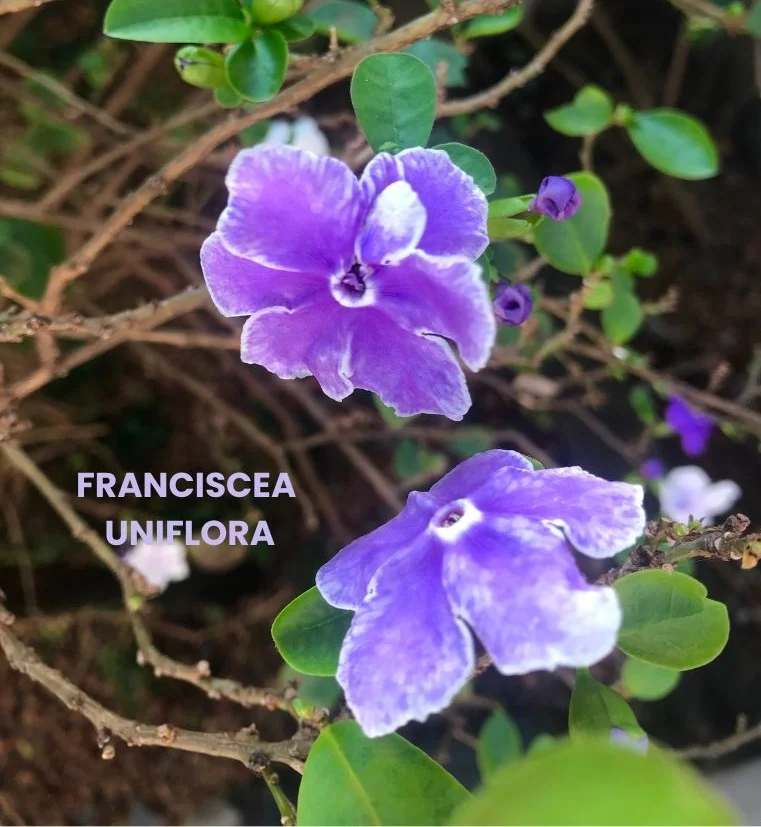Franciscea uniflora, commonly known as Manaca, is a plant native to South America, particularly Brazil.
It is well-known for its use in traditional medicine to treat various ailments, particularly those related to muscle stiffness, rheumatism, and syphilis.
The plant is valued for its ability to alleviate chronic muscle stiffness and provide relief from rheumatic and syphilitic pains.

SOURCE INFORMATION
Scientific Classification
- Kingdom: Plantae
- Clade: Angiosperms
- Clade: Eudicots
- Clade: Asterids
- Order: Gentianales
- Family: Apocynaceae
- Genus: Brunfelsia
- Species: B. uniflora
Common Name: Manaca
Origin
- Manaca is native to tropical regions of South America, especially Brazil.
- It thrives in warm climates and is often found in forests and along riverbanks.
Historical Facts
- Traditional Use: Indigenous people of South America have used Manaca for centuries to treat various ailments, particularly those involving joint and muscle pain.
- Introduction to Homeopathy: Manaca was introduced to homeopathic medicine due to its observed effects on chronic muscle stiffness and rheumatism, making it a valuable remedy for these conditions.
DRUG PATHOGENESIS
Manaca acts on Muscular System, Skeletal System, Nervous System, Cardiovascular System, Urinary System
KEY CHARACTERISTICS
- Muscular Stiffness: Chronic stiffness of the muscles, making it difficult to move or perform daily activities.
- Gonorrhoeal Rheumatism: Effective in relieving rheumatic pains associated with gonorrhoea.
- Syphilis and Rheumatism: Alleviates pains related to these conditions, accompanied by a sensation of great heat over the body and much aching.
- Band-like Headache: A sensation of a band-like feeling around the head.
- Back Pain: Pain in the back of the head and spine.
- Pericarditis with Rheumatism: Addresses inflammation of the pericardium (the membrane enclosing the heart) associated with rheumatic conditions.
- Rheumatic Pains: Particularly affects the feet and lower part of the legs.
- Uric Acid in Urine: Indicates its use in conditions where uric acid is present in the urine.
DETAILED ORGAN SYMPTOMS
HEAD
- Band-like Headache: A constricting sensation around the head, often causing discomfort and tension.
- Pain in Back of Head: Persistent pain located at the back of the head, which can extend down the spine.
MUSCLES
- Chronic Stiffness: Persistent stiffness in muscles, making movement painful and restricted.
- Rheumatic Pains: Pain and discomfort in muscles and joints, especially in the feet and lower legs.
CARDIOVASCULAR
- Pericarditis with Rheumatism: Inflammation of the pericardium, often seen in patients with rheumatic conditions.
URINARY
- Uric Acid in Urine: Presence of uric acid in urine, which can be a sign of gout or other metabolic disorders.
MODALITIES
- Better: Sweating provides relief from symptoms.
- Worse: Symptoms may worsen without sweating or if the body remains dry.
WHAT ARE MODALITIES IN HOMOEOPATHY?
RELATIONSHIP WITH OTHER DRUGS
Compare with:
- Bryonia: Used for muscular pain and stiffness, especially when movement worsens the pain.
- Rhus Toxicodendron: Effective for rheumatic pain, particularly when initial movement is painful, but continued movement provides relief.
- Sypkhilinum: Used for syphilitic pains and conditions related to syphilis.
DOSE
- Tincture or Fluid Extract: 10 to 60 minims.
Frequently Asked Questions
What conditions does Franciscea uniflora treat?
- It treats chronic muscle stiffness, gonorrheal rheumatism, syphilis-related pains, pericarditis with rheumatism, and rheumatic pains in the feet and legs.
- It is also used for conditions where uric acid is present in the urine.
How is Franciscea uniflora administered?
- It is administered as a tincture or fluid extract, with doses ranging from 10 to 60 minims.
Are there any specific symptoms that indicate the use of Franciscea uniflora?
- Yes, symptoms such as chronic muscle stiffness, a band-like feeling around the head, pain in the back of the head and spine, and rheumatic pains in the lower legs are indicative of this remedy.
Meaning of Difficult Words
- Pericarditis: Inflammation of the pericardium, the membrane enclosing the heart.
- Minims: A unit of volume in the apothecary system, typically used for measuring liquid medicines.
- Tincture: A solution of a medicinal substance in an alcoholic solvent.
- Uric Acid: A chemical created when the body breaks down substances called purines, high levels of which can lead to gout.
- Rheumatism: A general term for conditions causing chronic, often intermittent pain affecting the joints or connective tissue.
- Syphilis: A bacterial infection usually spread by sexual contact, starting as a painless sore.
- Leucorrhoea: A white or yellowish discharge from the vagina, often due to infection or other conditions.
